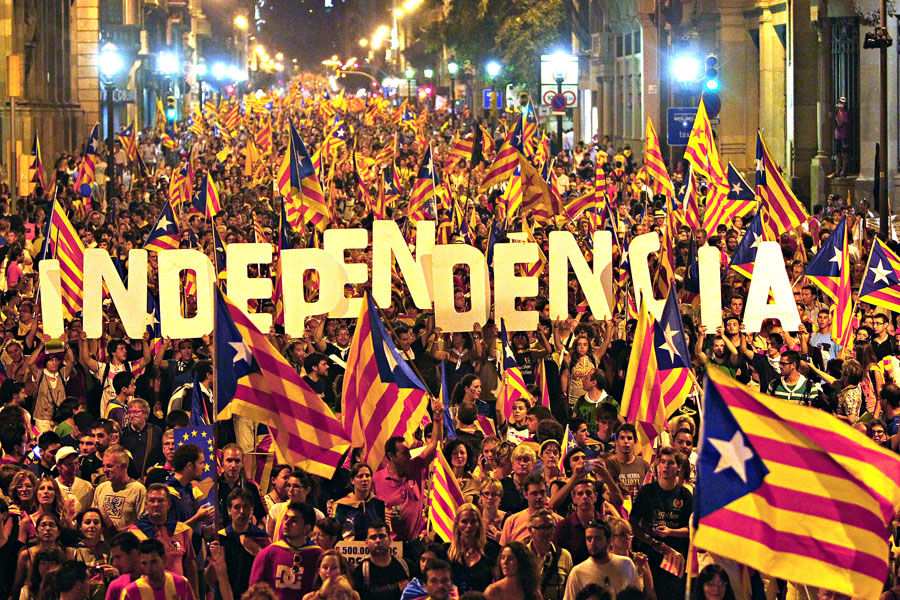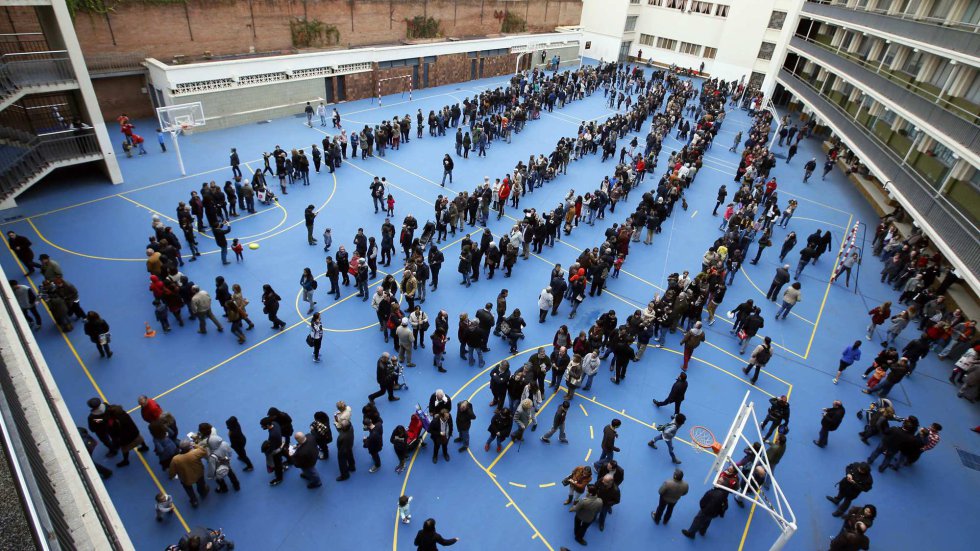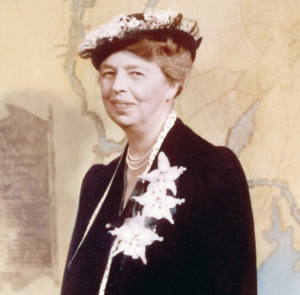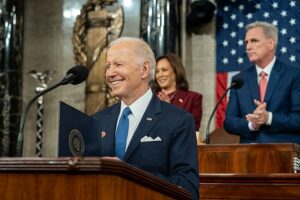In Spain Of Thrones, Catalonia is playing dead


For the first time in five years, the growing mass in favor of an independence process for Catalonia, the northeast and richest region in Spain, seems tired and bored. There were plenty of massive rallies during these years—a 300 mile human chain in 2013, a 1.8 million people gathering to form a V shaped flag in 2014—but now, after last November’s symbolic referendum, it is getting hard for the movement to regain momentum.
Recent polls suggest that support for a declaration of independence is just 44 percent of the voting population—for the first time since September 2012—there are more people that prefer to stay in Spain.
Five things drove the movement to this stale point: political quarrels between the main pro-independence parties, Podemos stellar appearance, an alleged abatement of Spain’s economic crisis, the lack of a key event on the closer horizon, and the feeling that everything could change during May’s local and regional elections.
While some believe that this is the end of the Process (as the pro-independence strategy is known) it is wiser to think that Catalonia is playing dead and waiting for a new, sudden reemergence.
Podemos: from a hype to the-real-thing
Podemos—“We can” in Spanish— is a leftist, populist party born in Madrid’s public university and spread throughout villages and neighborhoods in mini node organizations called “circles.” With Pablo Iglesias, a young professor and journalist, as its Secretary-General, the party shook Spanish politics up during the last year.
Its rapid rise was followed, promoted, and feared at the same time by the media. Pablo Iglesias helped magnify expectations when he admitted he could be Spain’s next president. These high expectations, especially if unmet, will be a problem for him and his young party.
Andalusia, the most populated autonomous community in Spain, celebrated its very anticipated regional elections last March. An historical Socialist Party (PSOE) feud, it was expected to be Podemos first step to take over Spain. Although Podemos obtained good results for a newcomer—14.9 percent of the vote, it got a modest third position below the two major parties in Spain, PSOE (35.4 percent) and PP (26.7 percent), not enough to become a real threat.
Podemos had been proclaiming that they were going to bring a fast change to Spanish politics. They had launched a blitzkrieg—a thunder operation to generate enough excitement to get all the power fast. So after these elections, they have toned down their rhetoric and seem to be focusing on a slower long-term electoral battle.
They also recently faced their first major internal crisis. Juan Carlos Monedero, a political scientist and one of the three corners of the central triforced leadership of the Party, resigned amid controversy over his supposedly receiving payments of at least 425,000 euros from Venezuela, Bolivia, Ecuador and Nicaragua and, according to his tax information, not covering them correctly and on time. Monedero accused Podemos of resembling conventional parties, deviating from the initial objectives and blurring its horizontal nature.
In Catalonia, an already plural electoral map has become even more complex with the arrival of Podemos. Next municipal elections on May 24 present multiple baroque coalitions with parties competing in one city and allying in the other.
In the Catalan capital, Barcelona, Podemos is forming a coalition with ICV (green left) but not with CUP (pro-independence left). In other big cities, such as Badalona, it’s doing the opposite. Indeed, only in a few places will Podemos use its own name and not the coalition name.
Before the Andalusian elections, it was commonly said at radio and TV discussions that Podemos had changed the Catalan panorama to the extent of breaking the pro-independence strategy. Now it is getting harder to estimate the real consequence of this force.
These doubts will start to clear off in some weeks.
Greekish battlefield
Spanish politics seem to emulate HBO’s Game Of Thrones right now: anyone could win or lose; it is even unclear what “winning” means. Polls are failing to give a clear perspective on the situation —results change every week—and nobody really knows who is going be put in power, or how and why.
PP, the right wing party that is governing everywhere in Spain—except Catalonia and the Basque Country—is in free-fall after multiple corruption scandals. But it has been in a similar situation before and managed to protect itself. It also gets the last word on when the general elections take place, so it has the advantage of controlling the board game. (In Spain, the primer minister has the power to choose the exact day of the elections: within a month after the end of the legislature and whenever he wants before the end of it).
PSOE, the centrist Social Democrats, are trying to regain popularity after a gigantic defeat and face problems defining themselves between PP and Podemos. Their leader, Pedro Sánchez, received bittersweet news from Andalusia: his party won handily, marking an important recovery, but now its regional leaders are pushing hard to become the center of the party, and he may lose authority.
Podemos has been Spain’s main topic of discussion for the last months, swimming in constant speculation. The truth is it can only gain ground, as these are its first municipal and regional elections. But Andalusia’s results show the difficulty of translating hype into real power.
Ciudadanos—“Citizens” in Spanish—is the politically ambiguous, populist party born in Catalonia and now exported to Spain. It has been endorsed by Madrid elites as a right wing centralist Podemos clone. It is a new, more aggressive, and harsh version of former Prime Minister Aznar’s PP but less old and less corrupt. Madrid elites are betting on this young party now that PP is showing weakness. Its growth will determine the fate of current Prime Minister Rajoy and his government.
In Catalonia, CiU, the center-right conservative and liberal party is also very damaged by several corruption scandals, including an undeclared and unclear fortune of the “founding father” of the post-dictatorship Catalonia, Jordi Pujol.
Esquerra, the center-left pro-independence party, is anxious in trying to figure out how to get votes without breaking the pact that they signed with CiU promising to declare independence in 18 month after winning the elections. But they also need to avoid looking like CiU’s puppet.
CUP, a far left pro-independence party, is slowly but continuously growing. Although they have been compared to Podemos, CUP isn’t aspiring to radically transform the political landscape overnight. But they are getting some attention, mainly thanks to David Fernandez, a journalist and CUP member at the Catalan Parliament, who is becoming loved even by right wing voters for his intellectual remarks on social and political topics.
Since reestablishment of democracy, the two main parties in Spain, PSOE and PP, have been alternating in power—making it a de facto bipartisan system. Catalan politics, although more diverse, have also been under the control of two major parties. This situation is in danger now. At least four parties in Spain and five parties in Catalonia can expect to get enough prominence to decide the future of the country and its political battles. The situation has grown similar to traditionally multipolar electorates in Italy or Greece.

September 27: elections or referendum.
Everything will be a little clearer next September, when Catalan voters decide whether these are regular regional elections or a plebiscitary vote over independence.
Some competitors have accused Artur Mas, Catalonia’s prime minister, of taking advantage of elections to achieve his political goals. He is also criticized for the use of the independence Process to shield his party’s corruption from bad electoral results.
Supporters explain that the plebiscite election has been promoted by the constant refusal of any kind of negotiation by Rajoy’s government—unlike places like Scotland or Quebec where the respective central governments allowed for a referendum.
At the end, what seemed a date too distant for those in favor of independence—who have become silent and expectant—may be their delayed salvation: it gives them time to reorganize its masses and reawaken. Pro-independence parties are playing dead and waiting for their enemies to fall—Podemos to grow too slowly, PP to lose control of the situation—all while poised to explode again at the best possible moment with a seductive offer to the Catalan electorate. The question is: will there be enough time to be reborn?
Catalonia has ended a political era of linear acceleration and embarked on a roller coaster on which everything happens at once and nothing can be anticipated or done sharply. No predictions are possible for the next five months. It is as plausible for a resigned return to Catalan moderation to materialize as it is for a straight execution of an independence plan to become a new European State. This will definitely be an interesting season on Spain of Thrones: keep watching!
Albert Lloreta is a freelance Catalan journalist and videographer from Barcelona. He holds BA degrees in Human Arts and Journalism. He has directed several documentaries about journalism and music. He writes about literature, music and Spanish political, social and cultural issues. He also works on music video projects, web design and online marketing strategies.









1 thought on “In Spain Of Thrones, Catalonia is playing dead”